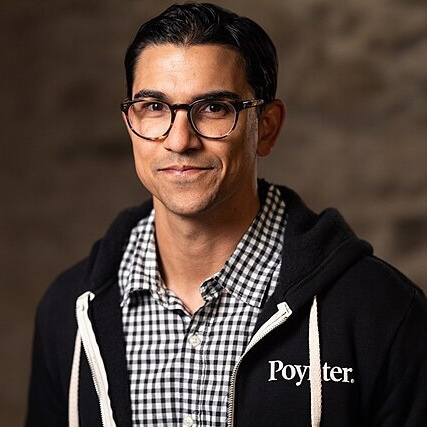DES MOINES, Iowa — In a straw poll conducted with mason jars and corn kernels, Elizabeth Warren came away with plenty of momentum in Iowa.
Warren won a third of the votes and stayed for two hours Saturday at the Iowa Steak Fry to take more than 1,000 selfies with fans at the annual cookout run by the Polk County Democrats at a park in Des Moines, which brought out nearly every candidate vying for the Democratic presidential nomination.
Afterwards, the Des Moines Register released a more scientific poll that put her in the lead in Iowa among the candidates.
But after talking to hardcore Democrats at the steak fry, the business of fact-checking was the other big winner — weeks after a series of articles in which progressives railed against it.
“I think fact-checking is critical,” said 66-year-old Katy Bason, a Warren organizer. “I don’t think you can be over fact-checked or worry about false equivalency.”
Reporters from MediaWise, a Google-funded project aimed at teaching teens digital literacy, and PolitiFact — along with 25 journalists from across the country participating in a Poynter-led training on how to cover the Iowa caucus — reported from the steak fry Saturday. It was an opportunity to talk to more than 12,000 of the most active Democratic voters in a state whose caucus will likely winnow down a wide field of candidates in February.
RELATED STORY: Here are 4 new terms to describe online deception and misinformation
Formerly the Harkin Steak Fry until former Sen. Tom Harkin (D-Iowa) retired in 2014, the folksy event offers the same chance for candidates, who flip steaks, hug attendees and snap selfies to get voters in their camp ahead of the caucus. The attendance represents 7% of the number of registered Democrats who took part in the 2016 caucus.
It’s like a focus group for the Democratic electorate, said Associated Press national political writer Tom Beaumont during the Poynter training. MediaWise and PolitiFact used the steak fry as chance to gauge whether voters viewed certain fact-checking as negatively as some Democratic candidates and operatives.
According to a Sept. 11 Politico article, “(President Donald) Trump’s bold lies and spreading of disinformation – which have been regularly cited by almost every mainstream news organization – are a core part of their case against him. But when those same outlets begin parsing Democrats for using questionable data and making exaggerations, they create the impression that everyone’s a fibber. When it comes to lying, Democrats say, Donald Trump has once again broken the bounds of politics as usual, and the media is only helping him by enforcing the old rules.”
WGBH followed up with a similar opinion piece Sept. 18, in which claims that the media was unfair to Hillary Clinton during the 2016 election resurfaced.
“The problem for 2020, as it was for 2016, isn’t that the media won’t report negative information about Trump,” wrote Media Nation blogger Dan Kennedy. “It’s that they will report negative information about his opponents in such a way that it all looks the same.”
The dozen self-described progressives I interviewed at the steak fry said they rely on fact-checking to decide on which candidate to support and to understand the differences among their policy proposals. And they don’t seem to take issue with the way outlets like The Washington Post or PolitiFact are covering the Democratic primary.
“Sometimes candidates get on stage and they start talking about health care plan costs but can’t really get it right — they drop numbers like $32 trillion or $34 trillion and you have to seek out a fact-checker to figure out which one is right,” said Ryan Moon, an Iowa resident who co-hosts a political podcast with wife. He uses a site like PolitiFact to weigh each candidates’ policies.
Cenk Uygur, progressive activist and founder of The Young Turks, said pressure on fact-checkers from the left is healthy, and keeps staff at their organizations and newspapers from kowtowing to pressure from the right to be harder on Democratic candidates. It fits into his overall critique of the mainstream media, which he claims is too focused on appearing unbiased.
RELATED TRAINING: PolitiFact’s Mueller Report Book Club Live
“It’s a little bit of an indictment of the mainstream media that they need fact-checkers,” he said. “They’re supposed to be the fact-checkers.”
Sen. Bernie Sanders has been the most visible victim of false equivalence, Uygur said. The Politico article highlights claims from Sanders and Trump that received the same “three Pinocchio”-rating: that large swaths of the southern border wall have already been built from the former and that 500,000 Americans will go bankrupt from medical bills this year.
Trump has consistently repeated that false claim, while Sanders’ was based on a study that said medical costs were only a factor in 500,000 bankruptcies.
“Sanders just keeps getting blasted by the mainstream media,” Uygur said.
For Rajdeep Oberoi, a 19-year-old Iowa State University student and Sanders supporter, the facts always matter.
Still Uygur, who was teaching at Poynter’s training on covering the Iowa caucus, didn’t totally discredit what fact-checkers do.
“Fact-checking is important so I’ll take a little false equivalency sprinkled in,” he said.
Correction: This story has been updated to correct the spelling of Cenk Uygur’s name. We regret the error.
Alex Mahadevan is a senior multimedia reporter at MediaWise. He can be reached at amahadevan@poynter.org or on Twitter at @AlexMahadevan.








**Attendees at Iowa Steak Fry vote ‘yes’ on fact-checking**
Did they?
Looks like there was no vote and no opportunity to vote “yes.” Instead the article talks about a handful of interviewees who expressed positive views of fact-checking.
Ironically, the title of this Poynter-approved article could qualify for Facebook’s limited distribution and demonetization programs if a fact-checker approved by (Poynter’s) International Fact-Checking Network bothered to fact check it.